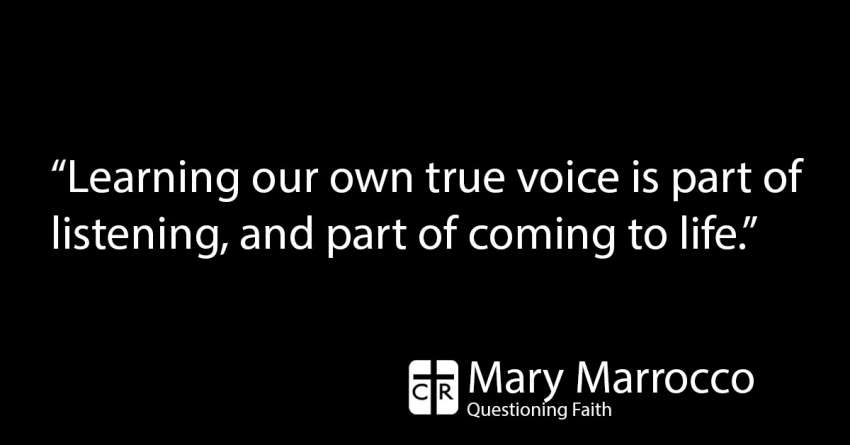That long-ago night is vividly present to me now, but far more vivid than the pain and fear is the voice of my brother, who accompanied me there. Through the waiting, intake, more waiting, tests, consultations, his calm quiet voice was a life-giving presence. It was a voice that said: “I’m here; you’re not alone; somebody cares about you; there’s a way through.”
A voice can be like that. Perhaps that’s because it echoes God, who comes to us, often, as a voice.
Recently I watched a new mother speak playfully to her baby, whose whole body was immediately engaged and attentive. This summer I watched our shepherd, Julio, speak to the sheep, who trust him and follow his steady voice, and grow in his care. It’s the type of voice we use with those we love, and they interpret it instantaneously, viscerally. It’s the voice of intimate encounter.
There is power in a voice, a power that’s unique.
It’s a power that can be troubling, when launched against us. Many, many voices come at us in our cacophonous world. The director of A Beautiful Mind uses visual images to help moviewatchers feel, a little, the power of voices: the tangled, confused web of voices that torment the mathematician with the beautiful mind. A bewildering distraction of voices jangles around and inside us all. Where, in all this chaos, could God’s voice be? How can we possibly find it?
The other side of God’s silence is God’s voice. As we learn to bear the silence of God, we begin to discover God’s voice.
“My sheep know my voice,” Christ assures us (John 10:27). There is one Voice among the many voices. And we know it; we recognize it. How could we not? We’re made of it. Adam and Eve hear God’s voice calling in the garden, even though they’ve hidden in shame (Genesis 3:8). Mary Magdalene sees the risen Christ but doesn’t recognize Him; when she hears His voice, she knows Him as her own dear Lord (John 20:17).
God’s Word springs forth from God’s eternal silence, says St. Ignatius of Antioch.
God’s is the voice of insistent desire. That voice may come out of the bright blue sky. It may well come in a state of emergency, as my brother’s voice did for me. Moses, who sees a bush burning, hears the voice of the God of Israel speaking His love for His captive people.
To hear God’s voice is a struggle — because it’s a call. Silence helps us pay attention to God speaking all the time. Being in silence teaches us God’s voice.
Hearing the voice of God is not “hearing voices.” Even Joan of Arc, who readily heard her “voices,” had to listen to the silence of God. Yet, an intermediary might speak God’s voice. God’s messengers in the Bible are called angels (Greek angelos means messenger).
In the Book of Tobit, Tobias’ eyes don’t recognize Raphael the Archangel, but his ears hear Raphael’s words offering divine guidance and healing. In Luke’s Gospel (1:28), Mary hears herself hailed by Gabriel the Archangel and told that God’s favour rests on her.
Whether through another or directly, God’s voice can be heard, even amidst the noisy chaos, even when we can’t see anything at all. Peter’s eyes and mind have no idea what’s going on at the top of Mount Tabor, but in the fog his ears hear the voice of the Father claiming Jesus (Mark 9:7).
God’s voice brings intimacy, but also invitation and mission. It can unsettle us and give an urgent task. Out of the fog of the Transfiguration, it exhorts: “Listen to Jesus.” Even when it comes in blindness, as with St. Paul en route to Damascus, it urges action — or rather, promises to bear fruit: “Enter the city” (Acts 9:6). Gabriel’s voice speaking to Mary calls her to the “yes” that will bring salvation. Raphael’s words to Tobias invite action — to his relief — and out of the action comes healing greater than he asked.
“My sheep know my voice,” but we may be less familiar with our own. We fear to speak, or speak haltingly or foolishly as St. Peter did, or are silenced in our arrogance as St. Paul was.
God’s voice calls out our voice. He doesn’t force us to speak, but in the silence and the struggle to hear, He teaches our voice. Learning our own true voice is part of listening, and part of coming to life.


